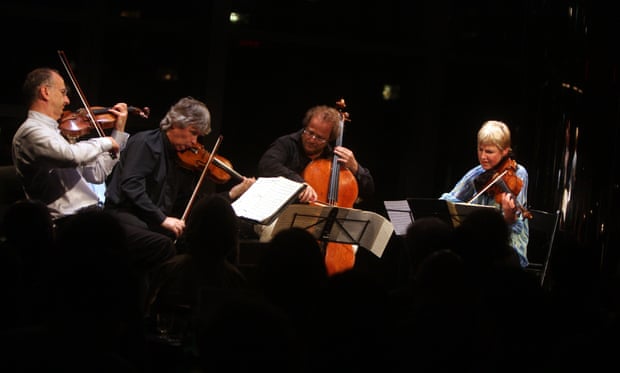Concert Review: Takacs String Quartet
September 20, 2016, Hong Kong University, Grand Hall
Takacs String Quartet
All Beethoven
I try not to miss a good string quartet. Even in HK, in recent years I got to hear the Borodin (multiple times), Hagen, Alban Berg, Emerson, Zehetmair, Shanghai, to name a few. I even follow younger quartets (in NYC), like the Artemis, Belcea, Parker and Jupiter. Since the early 80's, I have heard quite a few esteemed ensembles, like the Juilliard with Robert Mann as leader, and the incredible Talich and Stamic. However, there are just too many of them to catch up with, and somehow I have missed the Takacs, surely one of the world's most prestigious string quartets, until now.
I have however heard many of their CD's. I owe many of their older Hungaroton recordings, which with time are now displaced by their later, and more widely distributed Decca and Hyperion equivalents. As an example, I have both the 1985 Hungaroton (reviewed here by NYT) and the widely acclaimed 1998 Decca Bartok cycles, and they are very different, yet the equally superb Hungaroton is almost forgotten these days. Our public library has most of their recent Hyperion recordings, and I have heard all of them.
The now Colorado based quartet has two original members, second violinist Karoly Shranz and cellist Andras Fejer. Juilliard trained Englishman Edward Dusinberre has been the first violinist since 1993, and the current violist is American Geraldine Walther.
The quartet is over forty years old and has had quite a few personnel changes - that's enough turmoil to cause even great ensembles to disintegrate or deteriorate. Yet the Takacs have managed to stay on top of the game, quite a feat!
Edward Dusinberre has just written a book Beethoven for a Later Age: The Journey of a String Quartet, which has been well received. Some reviews (Telegraph, Independent) allow us peripheral glimpses into the inner workings of the quartet. The author himself introduces his book and in The Guardian touches on his life with the Takacs. A revealing passage in this article described Dusinberre's doubts when recently performing the Op. 132: "...Struggling on stage to maintain my energy, I could not judge if we were
communicating an appropriate sense of repose or merely sounded
lethargic. Typically, Beethoven’s musical phrases tell a rapidly
evolving story, requiring a sense of direction and clear shaping, but
here the pace of events is extraordinarily slow.."
I suspect during some parts of the performance Dusinberre would have entertained the same doubts again, as we did too. The first few numbers of the Op. 131, which concluded the concert, felt rather piecemeal and devoid of vitality. Fortunately, the quartet seemed energized by the Presto, and played expressively in the Adagio and Allegro that ensued. Overall, Beethoven's elusive and mercurial shifts in his late works were not caught; and a certain spiritual sense, be it struggle or longing, were not in view. A certain pallidness also pervaded the opener, Op. 18/2, sounding over-studied, hence lacking in classical repose and fluidity, the latter in my opinion the most important element in the early quartets.
Make no mistake, the Takacs are a supremely accomplished ensemble. No matter the composer, the current incarnation on records never stray far from a proper style, and that is no easy thing and must have taken a lot of work. At their best, their playing was at ease, their sonority blended and full-bodied, as evidenced by the accomplished performance of the Op. 95. In terms of sonority, this performance mirrors closely what I have heard on Hyperion.
Chemistry is an interesting and elusive thing. One of the greatest and most cathartic chamber music experience of mine was first hearing the Borodin Quartet in Macau with only one of its founding member, the immortal Valentin Berlinsky. That evening, Borodin's Second String Quartet, not a usual favorite (nor mine), was played and I was astonished that suddenly tears streamed down my cheeks. In the ensuing years, after Berlinsky passed away, I heard the quartet a couple more times. Despite the fact that the first violinist, Ruben Aharonian, is a superb violinist (who I think can walk the line and live more dangerously than Dusinberre, though I'd hate to compare them this way) and had achieved rapport with Berlinsky in the lineup, subsequent performances just suffered in comparison. One sighs. Things change and can never be the same.
That was my first time in the Grand Hall of Hong Kong University. It is similar in construction (plan and material) to the various good-sounding City Halls. The sound was good, though my friends complained the cello was not loud enough. I rather think the dynamics was a little subdued. Somehow I suspect that played a role in what I heard. An enigma.
